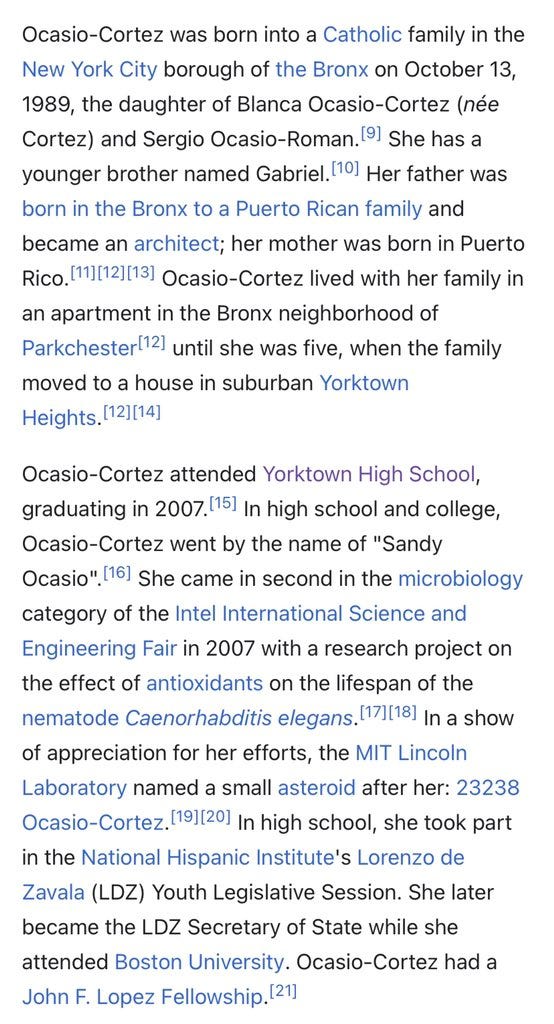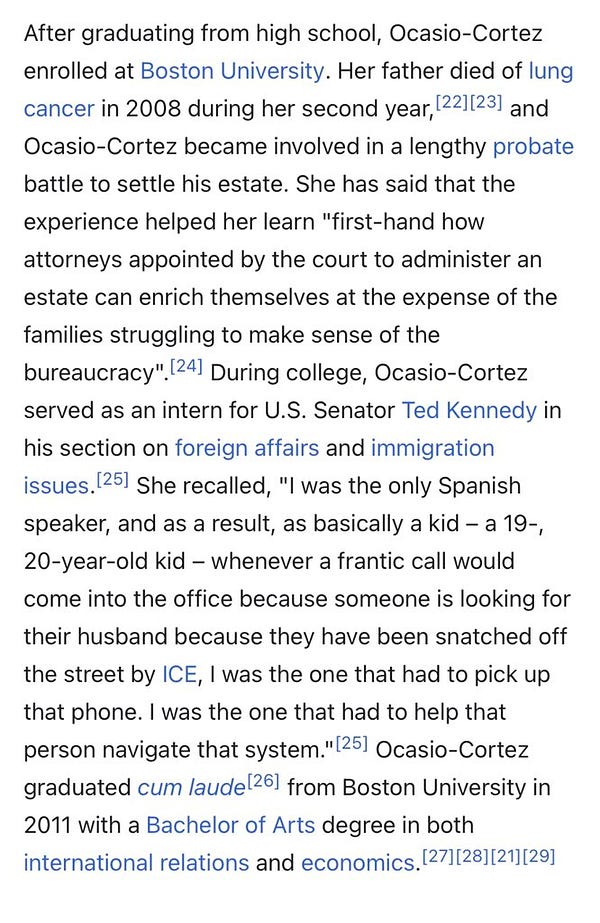Why I Donated to AOC: The Realities and Politics of Housing and Rent
"Houses are for living, not speculating."
Many members of my family might properly belong to what you might call the landlord class.
They cobble together enough money and buy a second or third home and then rent it out. Or, they have enough cash on hand to buy out their siblings when one of their parents passes on. Usually they buy these houses in areas that are undergoing some degree of gentrification so their investment becomes a kind of speculation. Other times they buy the house in an area where housing is restricting and the home appreciates in value like a sort of bank account.
Everybody wants “mail box money.” That is, money you don’t really have to work for. (It’s a trap!) But alas, the problem of being a middle class landlord is that when something breaks you have to fix it yourself.
I spent many a summer vacation or holiday toiling away with a Sawzall or using a nail gun. My (retired-ish) father, well into his sixties, still spends most of his time fixing up our childhood home in suburban New England. He should have sold it long ago, especially now that my mother and he are empty nesters.
Dad is, for all his talk of a scientific education, something of a romantic. You never sell property, he says, but I view it more or less as an essential, if annoying, aspect of everyday life. After my divorce I more or less lived (happily) in hotels. And I fear as I get richer my eccentricities proliferate. Though I’d like to be married someday the idea of living in an Airstream or modified school bus or bouncing around the world holds tremendous appeal for me. I had nearly one million Marriott points at one point and lived on it as a sort of currency. Would recommend.
Still I know more than your average nerd about how to do electrical work, plumbing, that sort of thing. “Land rich, cash poor” might be how you'd describe this lifestyle. By weekday my family members are school teachers or small business owners. By weekend they become carpenters or plumbers or interior designers. Still, it’s something to do.
My ex-wife and her family do much the same thing. Everyone is trying to get a “good tenant” and will do nearly everything to keep such a person, often going to absurd lengths — discounted rents and the like — just to keep them around.
Though I’ve been a home owner in the past I’m now firmly in the renting category. I’ve lived in hovels — I bought a mattress off of Craigslist once (okay twice) — and luxury apartments — my Manhattan apartment right out of college was $8k a month and then $800 a month — and everywhere in between. I have lived in the West, South, Midwest, and East Coast — in country, suburb, and city — so I’ve seen the range of housing options available. I’ve even spent a semester living in a tent in Southern California.
I like living in my head and reading, thinking, writing, talking, investing. That’s how I make my way in this world. It’s not for everyone but it’s for me. I suspect I am like a lot of nerds in that way.
Yes, housing is something I’d prefer not to think about much and I don’t think healthy societies extract rents but innovate. Housing should be a depreciating asset as it is in Japan where homes become less and less valuable over time. Such an approach would mean a total transformation in America. Dare we attempt it? I wonder.
A few years ago Peter Thiel once told me how irked he was that so much of the money his fund invested wound up going to Bay Area landlords who are often predatory slumlords. I have long since wondered what if life weren't like that? What if there were jobs that we decided collectively deserve housing in our communities?
I don’t really believe in homeownership and I actually actively discriminate against those who talk a lot about property. It’s dull and if you’re around dull people long enough you can catch it. A few years back a billionaire friend of mine confessed that he invested in housing because “it’s what you do when you run out of ideas.” I hope to be dead long before I run out of ideas or the will to execute them. And when I do die, sequence me, clone me, poke and prod me but let me and my cadaver be useful. Even in death I want to be useful.
I’m into satellites, genetics, facial recognition, etc. — “that sci fi shit” into which I poured my paper route money. I stand in wonder about how so many of the fevered dreams of my childhood can now be turned into companies which make a material difference in the world. You’ve only got so much time on this Earth and I prefer spending my time thinking about the galaxy of possibilities.
Most recently a company I invested in sent another satellite into space. Thinking of those satellites orbiting the earth gives me a kind of comfort. As a boy my father recalls the fervor around Sputnik orbiting the Earth. His son now has a growing constellation of satellites taking pictures and keeping the Russians and Chinese (and others) honest. Whatever agreements we have on international affairs we ought to take seriously and to use sensors to monitor them.
Still, you’ve got to live somewhere and there’ll be no large housing for me.
At least until I have more children and even then my girlfriend reminds me: “You don’t owe your children square footage—just a childhood.”
I agree with the Chinese dictator Xi Jinping: “Homes are for living not speculating.”
I do wonder why we tolerate the Chinese speculating in our housing market when they don’t tolerate it in theirs but perhaps it’s a lot like how the Russians push gun ownership in America by compromising the NRA while having bans on most weapons they want to make freely available in America.
You can use libertarianism as a weapon to destabilize a society. In subsequent posts I’ll be examining how libertarianism is itself something of a foreign op.
A friend writes in. He is a polyglot like yours truly and he has traveled the world and reports about what’s been going on in Berlin to address the Chinese influx of capital.
His experience comports with mine though he is a bit older. I also enjoy the new Netflix series Babylon Berlin. An ex-girlfriend of mine lives in Berlin and she finds it livable and very wunderbar in part because Berlin is so cheap. She’s living her best life, a life she couldn’t possibly have afforded in Manhattan or Chicago before or after coronavirus.
Charles
Last September, the voters in Berlin approved a far reaching proposal to give the state government of Berlin the right to nationalize all the rental properties in the City. The referendum was a result of the explosive growth in property prices and rents in Berlin over the past five years.
I listened to all the candidates from the six political parties discuss this issue on a weekly political podcast. They all agreed it was a problem and the source was money from outside Berlin, yes outside Germany.
Amsterdam struggles with the very same issue.
The flood of money into Berlin is striking. It is an indication that Berlin is resuming its long standing role as the sewer of Germany. In the 1920s, normal Germans hated the city and were only too happy to see the National Socialists clamp down on the vice and corruption. In this regard, the Netflix Series "Babylon Berlin" provides a remarkably clear headed look at Berlin in 1929. The first scene is a police raid on a child porn operation and we are then introduced to a young woman who hopes to become a policeman but works as a part time prostitute to keep her family from being evicted. You would expect the series to start with an American rabbi waving his finger at his German acquaintances. In fact, you don't hear about Nazis until the last episodes. The Weimar Republic in all its ugliness is on full display.
In 1991, the German Bundestag voted by a slim 337 to 320 to move the capital from Bonn to Berlin. I suspect that the opponents of the move knew what would happen. A massive building program for the new capital would be rife with waste and corruption making sure that Berlin would regain the place it had in the 20's. No building program would have been needed for Bonn and no Chinese or Russian investors would want to live in downtown Bonn. Berlin is a different story.
The big building boom ended and the grifter/investors now started looking at other aspects of Berlin. Property.
Amsterdam has always been a conduit for dirty money. The Dutch have always tolerated it but tried to regulate it.
I think that is the difference with the US and country like Holland, or Germany. The Dutch government can actually come up with policies to dampen the flow of money into real estate and help ordinary Dutch get into a house. The new government installed this week has a special minister for affordable housing.
Do you see something like that in the US? I am not sure that I do.
There’s only one champion of this cause — and that’s AOC, the anti-mob warrior.
You might not like it but watch her closely as I have. Already she lives rent free in the neocon mind and that’s because they recognize talent. If you look extremely closely at both AOC and Ilhan Omar you can tell that they are very speCIAl.
How speCIAl?
Well, read this Twitter thread which I’ve helpfully reproduced for you here. (I recommend the entire thread.)






Now I’ve got my qualms with AOC — I think she’s way too close with the Israeli deep state (though perhaps not as close as it would appear) — but I’ve come to admire her.
I’ve known AOC since her days at Boston University where she was a contemporary of mine. She went by Sandy then and I remember eating a burrito with her at Felipe’s Taqueria. We had mutual friends in common and I nearly attended BU myself. And I’m more or less convinced by the left-wingers who accuse her of being a CIA plant. In fact I suspect one day I’ll be reading about the excesses of President AOC’s CIA-backed government in something like Covert Action as I have with Presidents Clinton and Obama.
Far from some wild lefty she struck me as a kind of good government type. It seemed obvious then as it does now that she would be a presidential candidate one day. She just had that vibe to her.
If she runs against Chuck Schumer I’ll support her.
AOC has done more to roll back Big Tech excesses than anyone short of Matt Gaetz, who, along with Ken Buck, helped pass a law giving the Federal Trade Commission more powers to go after Big Tech.
I’m told it’s Gaetz and Buck that pushed the House Freedom Caucus to be more trust busting.
On housing AOC’s been down this housing road before though this looks like the first time.
Her legislation—called the “A Place to Prosper Act”, and one of a six-bill package to address economic inequality titled “A Just Society”—aims to keep tenants in place by establishing a national cap on annual rent increases, restricting evictions without just cause, and guaranteeing a right to counsel for tenants facing eviction.
In focusing on tenants’ rights, the legislation diverges from a congressional norm dating back to the Reagan era: prioritizing new construction and homeownership over renters’ rights. Recent congressional efforts to address the housing crisis have sought to build new units by expanding the Low Income Housing Tax Credit, which incentivizes private developers and investors to provide low-income housing, and break barriers to homeownership by lowering mortgage costs. But Ocasio-Cortez’s legislation intends to protect tenants in the homes where they already reside.
Her latest YIMBY approach? Using housing policy as the issue getting PAC’s endorsement and backing.
Courage to Change — the PAC that AOC started to get more progressive and working-class people into office by funding their campaigns — just released its 2022 pledge, which includes a number of policy commitments aimed at making “housing permanently affordable, inclusive, and widely available.” Specifically, AOC is asking prospective candidates to rewrite the rules on zoning — the weedy and arguably most consequential city policies to housing — so cities can build more of the kind of housing that actually relieves the housing crisis, namely multifamily, mixed-income buildings. This might include ending single-family zoning, reducing the minimum lot size for development, and enabling affordable housing in affluent neighborhoods. Crucially, AOC is asking those who sign the pledge to vow to carry out these pro-housing policies “even if the local official representing that neighborhood was opposed.”
There’s a grand bargain here if politicians would get it together.
Could Congressman Matt Gaetz and Alexandria Ocasio-Cortez come together and bar Chinese money from flowing in while restricting slumlords from screwing tenants? I wonder…
You could deny federal funding until more housing gets built. Rural Americans and suburbanites would love that, too — if only to keep the urbanites out!



